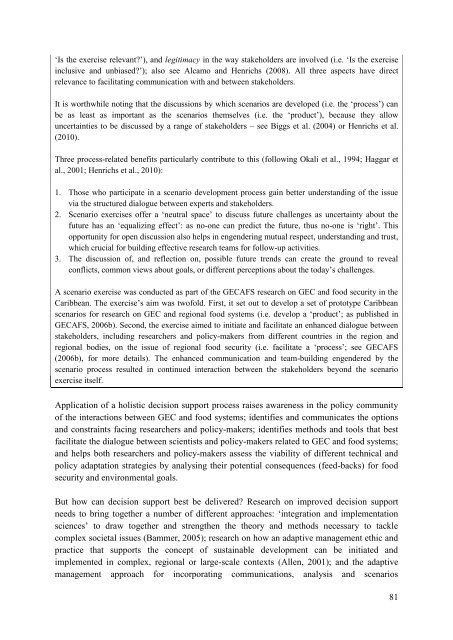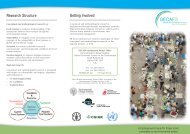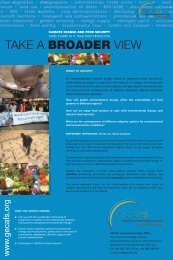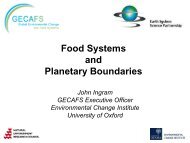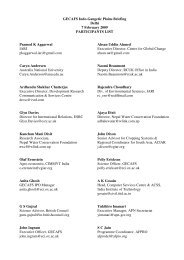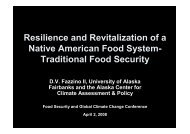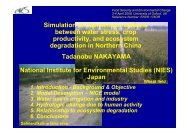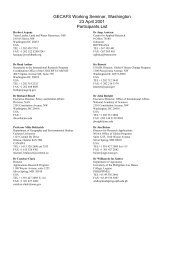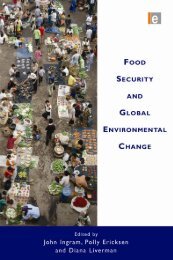From Food Production to Food Security - Global Environmental ...
From Food Production to Food Security - Global Environmental ...
From Food Production to Food Security - Global Environmental ...
- No tags were found...
You also want an ePaper? Increase the reach of your titles
YUMPU automatically turns print PDFs into web optimized ePapers that Google loves.
‘Is the exercise relevant?’), and legitimacy in the way stakeholders are involved (i.e. ‘Is the exerciseinclusive and unbiased?’); also see Alcamo and Henrichs (2008). All three aspects have directrelevance <strong>to</strong> facilitating communication with and between stakeholders.It is worthwhile noting that the discussions by which scenarios are developed (i.e. the ‘process’) canbe as least as important as the scenarios themselves (i.e. the ‘product’), because they allowuncertainties <strong>to</strong> be discussed by a range of stakeholders – see Biggs et al. (2004) or Henrichs et al.(2010).Three process-related benefits particularly contribute <strong>to</strong> this (following Okali et al., 1994; Haggar etal., 2001; Henrichs et al., 2010):1. Those who participate in a scenario development process gain better understanding of the issuevia the structured dialogue between experts and stakeholders.2. Scenario exercises offer a ‘neutral space’ <strong>to</strong> discuss future challenges as uncertainty about thefuture has an ‘equalizing effect’: as no-one can predict the future, thus no-one is ‘right’. Thisopportunity for open discussion also helps in engendering mutual respect, understanding and trust,which crucial for building effective research teams for follow-up activities.3. The discussion of, and reflection on, possible future trends can create the ground <strong>to</strong> revealconflicts, common views about goals, or different perceptions about the <strong>to</strong>day’s challenges.A scenario exercise was conducted as part of the GECAFS research on GEC and food security in theCaribbean. The exercise’s aim was twofold. First, it set out <strong>to</strong> develop a set of pro<strong>to</strong>type Caribbeanscenarios for research on GEC and regional food systems (i.e. develop a ‘product’; as published inGECAFS, 2006b). Second, the exercise aimed <strong>to</strong> initiate and facilitate an enhanced dialogue betweenstakeholders, including researchers and policy-makers from different countries in the region andregional bodies, on the issue of regional food security (i.e. facilitate a ‘process’; see GECAFS(2006b), for more details). The enhanced communication and team-building engendered by thescenario process resulted in continued interaction between the stakeholders beyond the scenarioexercise itself.Application of a holistic decision support process raises awareness in the policy communityof the interactions between GEC and food systems; identifies and communicates the optionsand constraints facing researchers and policy-makers; identifies methods and <strong>to</strong>ols that bestfacilitate the dialogue between scientists and policy-makers related <strong>to</strong> GEC and food systems;and helps both researchers and policy-makers assess the viability of different technical andpolicy adaptation strategies by analysing their potential consequences (feed-backs) for foodsecurity and environmental goals.But how can decision support best be delivered? Research on improved decision supportneeds <strong>to</strong> bring <strong>to</strong>gether a number of different approaches: ‘integration and implementationsciences’ <strong>to</strong> draw <strong>to</strong>gether and strengthen the theory and methods necessary <strong>to</strong> tacklecomplex societal issues (Bammer, 2005); research on how an adaptive management ethic andpractice that supports the concept of sustainable development can be initiated andimplemented in complex, regional or large-scale contexts (Allen, 2001); and the adaptivemanagement approach for incorporating communications, analysis and scenarios81


